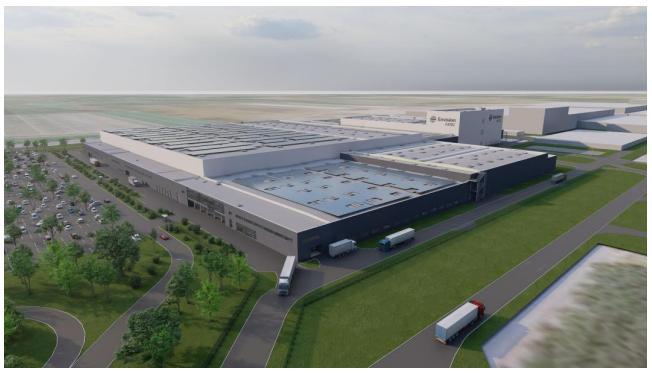
- The funding will provide battery supply of 9 GWh to power 200 000 electric vehicles produced by Renault each year from 2025.
- It comes under the massive EIB support strategy for the transition to decarbonised industry in Europe.
- This investment, in one of four battery gigafactories planned in the Hauts-de-France region, is guaranteed by the European Commission’s InvestEU programme.
The investment by the European Investment Bank (EIB) in the gigafactory to be run by Automotive Energy Supply Corporation (AESC) from 2025 comprises two operations: €337.2 million in direct loans to the project, and €112.8 million in indirect loans to participating commercial banks. From a production capacity of 9 GWh in its initial phase — slated to power 200 000 electric vehicles per year — the Douai site’s capacity will later be increased through three planned expansions, reaching between 24 GWh and 30 GWh per year by 2030.
This large-scale project represents a total investment of €1.3 billion for the first phase, with the creation of some 1 200 direct jobs over the next three years, and up to 3 000 jobs by 2030. The batteries produced in Douai in the first phase will equip Renault ECHO (new R5) and 4Ever models. In future phases, the gigafactory will also be able to supply other automotive and industrial manufacturers with electric batteries.
The construction project is in line with EU objectives for clean mobility. To achieve a green transition and carbon neutrality as set out in the European Green Deal by 2050, Europe must significantly increase its “Made in EU” battery production capacity. Through this investment, the EIB will further Europe’s transition to a decarbonised economy, strengthen its industrial sovereignty and help transform the automotive sector.
A global player in the development and manufacture of high-performance batteries for electric vehicles, AESC is already present in the United States, United Kingdom, Spain, China and Japan. Thanks to this first plant in France, the group will increase its battery production for European car manufacturers, accelerating the sector’s transition to competitive decarbonised mobility technology solutions.
For Matsumoto Shoichi, CEO of AESC, “Thanks to decisive financing from the European Investment Bank, the construction of this gigafactory is part of Europe’s goal of reindustrializing the region in a low-carbon manner. This includes the creation of new, high value-added jobs while providing access to our state-of-the-art technology. We are also proud to be able to advance clean mobility by making batteries and electric vehicles affordable.”
For EIB Vice-President Ambroise Fayolle, “This strategic investment in AESC allows Europe and its automotive industry to acquire industrial tools near their production sites — as will be the case for the ElectriCity cluster developed by Renault in Douai. As the climate bank of the European Union, the EIB is fully mobilised to ensure that the Europe of tomorrow has the capacity to produce electric batteries to respond to the climate emergency, and can strengthen the competitiveness of its manufacturers by relocating their value chains to local ecosystems, creating new jobs. That is why I welcome the introduction of this gigafactory at a time when the electric car market is experiencing a major take-off in Europe.”
Paolo Gentiloni, European Commissioner for the Economy, added, “Investing in clean mobility helps us to reach our climate targets and, at the same time, creates jobs and promotes sustainable growth. With the support of InvestEU, this investment in the production of electric vehicle batteries is expected to create thousands of jobs in the north of France, while promoting our transition to climate neutrality.”
Background information
About the European Investment Bank
Created by the Treaty of Rome in 1957, the EIB is the European Union’s long-term financing institution, and its shareholders are the 27 Member States. It provides financing for high-quality investments that help to achieve Europe’s key objectives, such as the European Green Deal, which aims to make Europe carbon neutral by 2050. As the EU climate bank, the EIB encourages the emergence and deployment of new technologies to meet the challenges of the energy transition to a new, low-carbon growth model. It has already participated in the financing of several battery gigafactories in Europe, such as Northvolt’s pioneering large-scale plant in Skellefteå in northern Sweden, starting in 2018. It is also involved in several other gigafactory projects in France. In 2022, the EIB’s investments in France in renewable energies, clean mobility and energy efficiency amounted to €5.9 billion, representing 70% of its financing in the country.
About Automotive Energy Supply Corporation
AESC is a global leader in the development and manufacturing of high-performance batteries for electric vehicles and energy storage systems. The Company’s leading-edge technology and reliability are enabling and accelerating the transition to clean energy solutions. Through rapid expansion, AESC batteries will soon power more than 1,000,000 million electric vehicles for the world’s top automakers.
AESC is creating the only stand-alone, pure-play business focused exclusively on advanced battery technologies. Incorporated and headquartered in Japan, the Company has a globally diversified management team, ownership structure and production footprint with major facilities in the U.S., U.K., France, Spain, China and Japan.
About InvestEU
The InvestEU programme provides the European Union with essential long-term financing, mobilising large volumes of public and private funds to support a sustainable recovery. It also helps to attract private investment in support of key EU priorities, such as the European Green Deal and the digital transition. The InvestEU programme brings together under one umbrella the many EU financial instruments currently available to support investment in the European Union, making financing investment projects in Europe simpler, more efficient and more flexible. The three components of the programme are the InvestEU Fund, the InvestEU Advisory Hub and the InvestEU Portal. The InvestEU Fund is implemented through financial partners who invest in projects using the €26.2 billion EU budget guarantee. The budget guarantee backs projects by the implementing partners, increasing their risk-taking capacity and mobilising at least €372 billion in additional investment.

